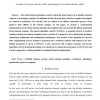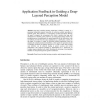152 search results - page 24 / 31 » Explaining Task Processing in Cognitive Assistants that Lear... |
117
click to vote
TEC
2002
15 years 1 months ago
2002
The clonal selection principle is used to explain the basic features of an adaptive immune response to an antigenic stimulus. It establishes the idea that only those cells that rec...
ECTEL
2009
Springer
15 years 8 months ago
2009
Springer
The orchestration process consists of managing classroom interactions at multiple levels: individual activities, teamwork and class-wide sessions. We study the process of orchestra...
115
click to vote
SMC
2007
IEEE
15 years 8 months ago
2007
IEEE
—Reinforcement learning is a framework in which an agent can learn behavior without knowledge on a task or an environment by exploration and exploitation. Striking a balance betw...
129
click to vote
WMTE
2005
IEEE
15 years 7 months ago
2005
IEEE
: There is an ever growing number of mobile learning applications based on location-awareness, However, there is still a lack of information concerning how it might impact socio-co...
295
click to vote
BICA
2010
14 years 8 months ago
2010
Deep-layer machine learning architectures continue to emerge as a promising biologically-inspired framework for achieving scalable perception in artificial agents. State inference ...


